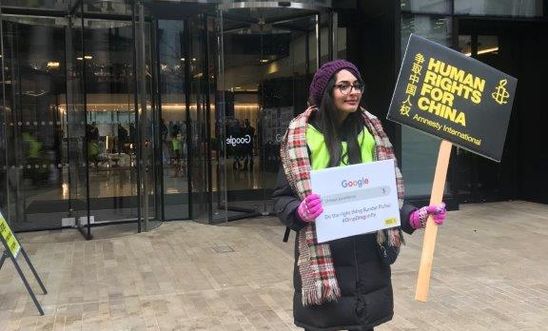
Press releases
Google staff at St Pancras headquarters 'don't want to be part of the great firewall of China'

Google’s plans to launch a censored search app in China fly in the face of the company’s professed values and don’t have the support of many Google employees, Amnesty International said today, as the organisation launched a global campaign against the move.
Following a public outcry from the internet giant’s own workforce, Amnesty protesters are today gathering outside Google offices around the world, including at Google’s London St Pancras office this morning as staff arrived at work, to encourage them to sign a new Amnesty petition. The petition calls on Google CEO Sundar Pichai to drop plans for the app, codenamed ‘Project Dragonfly’, which would blacklist search terms like “human rights” and “Tiananmen Crackdown”.
At various protests including in Hong Kong, Canada and America, Amnesty protesters will be joined by Google staff unhappy about the plan to produce a censored app. In 2010, Google reversed its decision to comply with Chinese censorship demands and pulled out of China following a public outcry.
Amnesty has also used Linkedin to approach Google employees and has produced a spoof recruitment video inviting people to work on Project Dragonfly. The video ends with a twist on Google’s motto: “Don’t be evil” - adding the caveat “unless it’s profitable”.
In response to criticism over Project Dragonfly, Google has said it is committed to respecting the fundamental rights of its users. However, the company has failed to explain how it would square this commitment with a project that appears to accept censorship and surveillance.
The company’s leadership has also tried to shrug off criticism by saying it has simply been exploring the possibility of re-entering the Chinese search market and that it does not know whether it “would or could” launch such a product. However leaked comments by a senior Google manager suggest that before the project was made public, the company had been working to have Project Dragonfly ready to launch as soon as possible.
Anna Bacciarelli, Amnesty International’s Researcher on Technology and Human Rights, said:
“Google staff don’t want to be part of the great firewall of China.
“It was Google staff who originally blew the whistle on plans to submit to China’s draconian censorship rules.
“This move would fly in the face of the company’s professed values and its founding motto ‘don’t be evil’.
“Google employees are not happy about compromising principles for profit. The people we met on their way to work this morning were supportive of our campaign and more than one of them told us to keep up the good work. We hope it won’t be long until we can say the same to them. Sundar Pichai should listen to his own workforce and drop Drangonfly now.”
Repressive internet censorship
The Chinese government runs one of the world’s most repressive internet censorship and surveillance regimes. In 2010, Google performed an important u-turn, publicly exiting the search market in China shortly after embarking on it, citing restrictions to freedom of expression online following a similar global human rights campaign. Since then, the Chinese government has intensified its crackdown and it remains unclear how Google would safeguard human rights in the current environment.
Leaked internal documents obtained by US based tech-news outlet The Intercept, show that the prototype app that Google built under Project Dragonfly would comply with China’s censorship rules by automatically identifying and filtering websites blocked in China and “blacklisting sensitive queries”.
According to The Intercept, the blacklist that Google has itself developed for the project includes the terms “student protest” and “Nobel Prize” in Chinese, as well as phrases that imply criticism of China’s President Xi Jinping. Google would also be compelled to cooperate with Chinese censors in cracking down on posts related to emerging social issues, such as the government’s response to China’s growing #MeToo movement and the internment of ethnic minorities.
The prototype app would also make it easier for the Chinese authorities to track individual user’s searches, meaning there is a real danger that Google would be helping the Chinese government to arrest or imprison people. Chinese laws and regulations force tech companies to cooperate with inspections by public security officials.
China’s global vision of a controlled internet
Launching Project Dragonfly would risk Google legitimising China’s vision of the internet, which gives government agencies absolute control over what information is available to the population and the power to freely access all online data about their citizens.
A recent report by Freedom House found that China is actively exporting its model of internet control around the world by conducting large-scale training for foreign officials, providing technology to other governments, and forcing international companies to follow its rules even outside China.